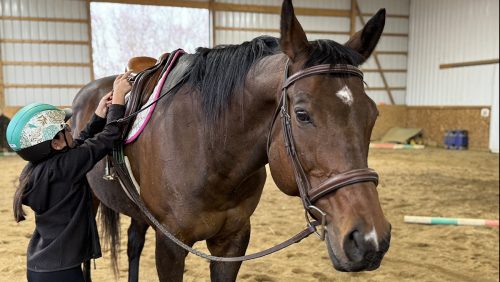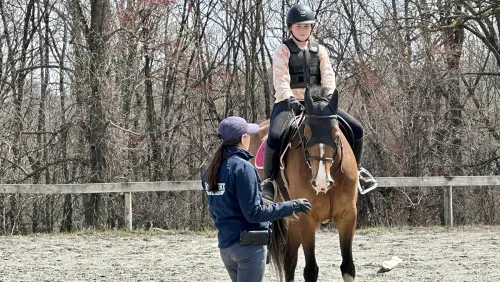I grew up riding in Virginia hunt country in the 1980s, an experience not for the faint of heart. When you fell off, you got back on—always—and there were no excuses for not riding. When I was 9, I finished a trail ride, including jumping solid stone walls and coops, after breaking my collarbone within the first 10 minutes. At 12, I rode my too large, too green off-track Thoroughbred through multiple bucking/bolting sprees, eventually keeping a paper bag in my back pocket that I pulled out when I inevitably began hyperventilating. When your lesson was scheduled or the horse show was booked, you rode your horse from start to finish. End of story.
I know that when I was growing up, my trainer did the best she could, passing along what she was taught: Get back on, be tough and get over it. Still, I can’t help but wonder if my own riding trajectory would look dramatically different if I hadn’t been overfaced at a young age without the power to stand up for myself or say no. As a pro, would I have been able to confidently ride any young spooky warmblood without holding my breath the entire time, anticipating the worst? Would turn-in and turnout times have been a non-event rather than a daily moment of anxiety? Would I have easily handled the biters, kickers, bolters, buckers, proppers, spinners and rearers that are inevitable as an exercise rider and groom in a stable of top-level, extremely athletic horses?

Sophie Coffey’s off-track Thoroughbred Shiloh, pictured here at Upperville (Va.), could jump as well as he could buck and bolt. Photos Courtesy Of Sophie Coffey
The truth is I’ll never know. I am who I am, and my life has been what it’s been, and there are no chances to go back and try again. In my professional days, I constantly compared myself to those who seemed to have no trouble doing things that made me chew antacids like candy, and I constantly felt like I came up short as a rider and a person. In my intro blog post, I said that I realized I didn’t want to sacrifice enough to take my riding career to the next level—that’s only partly true. The other part is that I knew I literally didn’t have the guts, and it gutted me.
When people ask me what the main difference is between being a professional and an amateur, I don’t say skill—let’s face it, many of our sport’s top riders are amateurs, and anyone can hang up their shingle as a professional. The main difference is the lack of choice that comes with having a P on your USEF card. Dangerous horse? Not great conditions? Too bad—it’s your job to deal with it; there’s no saying no. This parallel makes me believe my link from timid child rider to timid pro is linear. When my choice is taken away from me, that’s when my baggage gets heaviest.
As an amateur, it means that I need to maintain a level of honesty regarding my riding capabilities and to remember that I always have agency over how I choose to ride on any given day. For example, even though my horse purchase budget allowed for a fancy 2-year-old prospect, I decided to get my older, good-natured Paint-Appendix Quarter Horse instead because I knew that if my daily routine required sitting on a horse that was less than predictable, things would go downhill for both of us fast.
ADVERTISEMENT

“Crazy Eye” Jack was a cute but spirited horse whose name Sophie Coffey always dreaded seeing next to her initials on the ride board.
When people watch me ride, they would never guess that I am not naturally brave. I chat with fellow riders who I think are fearless and am surprised to hear that they too struggle with anxiety in the saddle. Lately, I’ve been heartened by all of the fantastic resources available to those without nerves of steel and by all of the top riders who are opening up about their own struggles and challenges around this topic. I still sometimes play the “what if” game with myself: What if I grew up riding in this current climate of increasing honesty and acceptance and sports psychology rather than the tough love times of yore? Would I be braver?
Maybe. Maybe not. But I’m done beating myself up over what might have been, or comparing my level of comfort to someone else’s as a litmus test to my sense of self-worth. Am I capable of doing what some others do in the saddle? No. Am I a “lesser than” rider because of that fact? Maybe. Does that matter? Only if I let it. Am I a “lesser than” person? Definitely not.
It’s a difficult leap to make, accepting your limitations, especially when you hold yourself to standards of excellence. It’s remembering that your limitations don’t define you as a Good or Bad rider or person. All you can be is the best, truest version of yourself, and that’s ultimately all our horses want from us anyway.
Sophie Coffey grew up riding by the seat of her pants in Virginia hunt country, and she took a flying leap into the top levels of the sport through sheer will and luck after a cold call landed her a job at Hunterdon, Inc. She continued freelancing as a jack-of-all-trades through her 20s for some of the top names in the industry, getting the best education possible in horsemanship and larger life lessons. After leaving the sport to pursue a career in marketing, she returned in 2018 as an adult amateur with a little APHA mare named Callie, who has a passionate love of peppermints and jumping with her knees to her eyeballs. She resides with her increasingly horsey husband and three cats in Boulder, Colorado.













